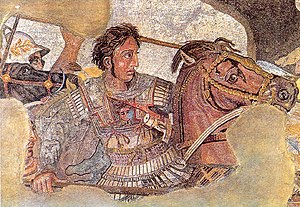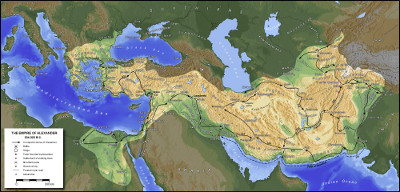Today in the year 323 BC (or possibly on one the the last 2 or 3 days) Alexander the Great  died in the palace of Nebuchadnezzar II, in Babylon at the age of 32.

Alexander (356 BC to 323 BC) was the son of King Phillip of Macedon and was educated my non other than the great teacher Aristotle. He first lead a victorious army in battle at the age of 16 and at the age of 20 succeeded to the throne when his father was assassinated.
By 334 BC he had secured the military command and in effect leadership of Greece and now assembled an army. He lead this army on to Persian-ruled Asia Minor. Over the next ten years Alexander first crushed the mightly Persian Empire at the battles of Issus and Gaugamela and defeated the Persian king Darius II.  He had conquered Egypt, Persia and gone on to invade Afghanistan.
With no limits to his ambition he strove to reach the “ends of the world and the Great Outer Sea” and so invaded India in 326 BC. FInally though it was not an enemy that foiled his ambition but his own army. After ten long years they were weary and wanted to settled down and live their lives and Alexander, confronted by a near-mutiny of his troops was forced to turn back.
Alexander’s death has an element of mystery to it. After a night and a day of feasting and drinking he collapsed and died 2 days later. Was it typhoid fever or was it assassination? Whatever the cause his death plunged his unified empire into civil war as various of his generals vied for power. None would be able to unite his once widespread realm.
Alexander was a charismatic leader who inspired his troops to great things. He was full of driving ambition . BUT he was also a warlord bent on conquest with little thought for those unfortunate to get in his way. Every one must make their own mind up about him. Â In this modern age he can seem warmongering and bloodthirsty and all peaceloving people will hope that the world would not see his like again.
Yet, like Napoleon and Caesar after him, he shared a burning drive and ambition to keep going and achieve something in their brief mortal lives: to make a mark on history. To me that surely MUST be worth some admiration.
One of the fun parts of writing historical fiction and time travel stories is the ability to encounter these great figures. Alexander features in Tomorrow’s Guardian when Tom and his friends get captured by him and again (after his death) in Yesterday’s Treasures when Tom and the Hourglass Institute must travel back in time and locate his tomb. I particularly enjoyed researching the facts about his missing tomb around which there is a mystery that perhaps will feature in another blog.



Related Articles
1 user responded in this post
[…] Link: Richard's Ramblings » Post Topic » Alexander the Great dies Jun 13 … […]